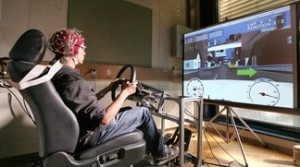Today’s blogging seems to have acquired a transportation theme. Here’s another item about a car, this one can read minds. From the Sept. 28, 2011 news item on physorg.com,
In the future, thinking about turning left may no longer be just a thought. Japanese auto giant Nissan and a Swiss university are developing cars that scan the driver’s thoughts and prepares the vehicle for the next move.
I found more information at the Nissan website in their Sept.28, 2011 news release,
As the driver thinks about turning left ahead, for example, so the car will prepare itself for the manoeuvre, selecting the correct speed and road positioning, before completing the turn. The aim? To ensure that our roads are as safe as possible and that the freedom that comes with personal mobility remains at the heart of society.
Nissan is undertaking this pioneering work in collaboration with the École Polytechnique Fédérale de Lausanne in Switzerland (EPFL). Far reaching research on Brain Machine Interface (BMI) systems by scientists at EPFL already allows disabled users to manoeuvre their wheelchairs by thought transference alone. The next stage is to adapt the BMI processes to the car – and driver – of the future.
Professor José del R. Millán, leading the project, said: “The idea is to blend driver and vehicle intelligence together in such a way that eliminates conflicts between them, leading to a safer motoring environment.”
…
Using brain activity measurement, eye movement patterns and by scanning the environment around the car in conjunction with the car’s own sensors, it should be possible to predict what the driver plans to do – be it a turn, an overtake, a lane change – and then assist with the manoeuvre in complete safety, thus improving the driving experience.
Here’s an image of some of the lab work being performed,
I wonder what it’s going to look like when it’s ready for testing with real people. I’m pretty sure most people are not going to be interested in wearing head caps for very long. I imagine the researchers have come to this conclusion too, which means that they are likely considering some very sophisticated sensors. (I hope so, otherwise the researchers are somewhat delusional. Sadly, this can be true. I speak from experiences dealing with technical experts who seemed to be designing their software for failure, i.e. the average person using would be likely to make an error.)
